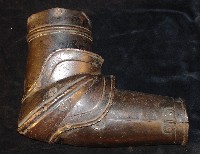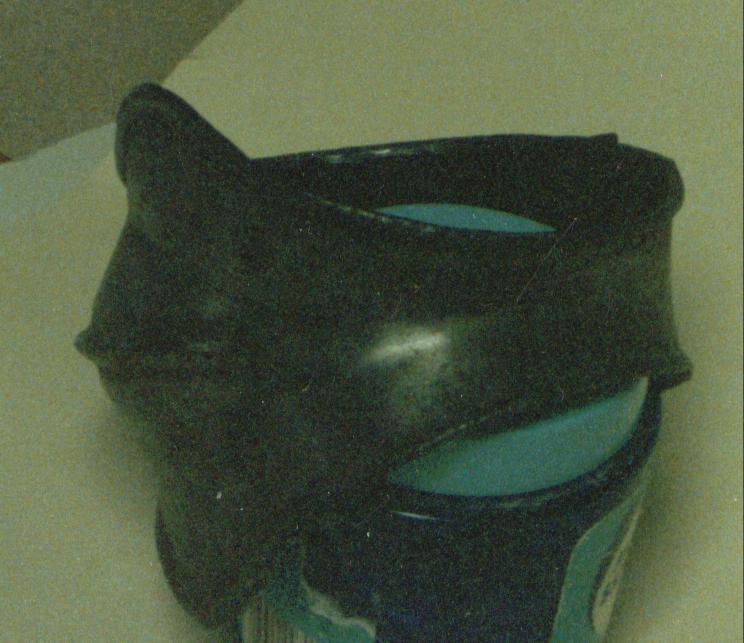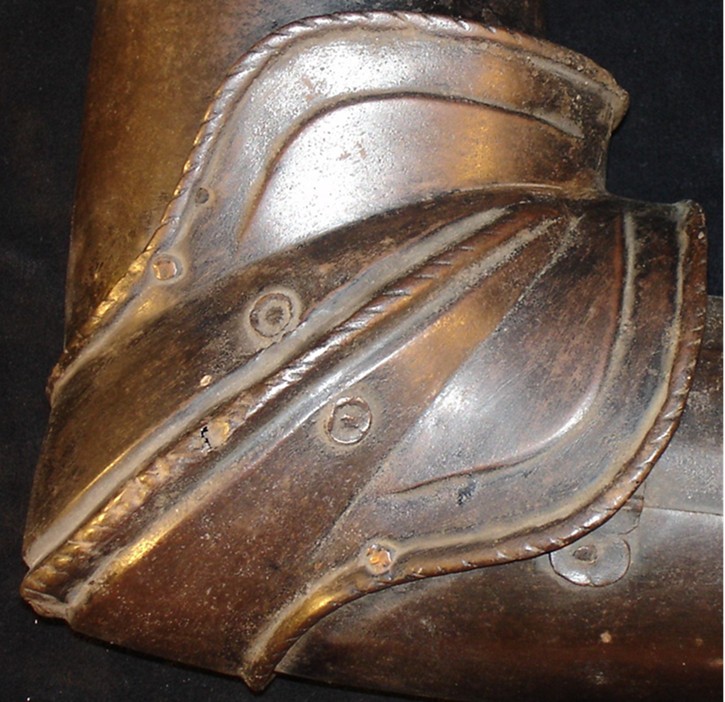Hi everyone!
What do think about that counter? (found in Lithuania during archaeological excavations)
[ Linked Image ]
[ Linked Image ]
[ Linked Image ]
I really need your opinion. Thanks
Paulius,
I would say that it is Italian or French, ca 1560-70. It may be German, but I do not think so. Personally, I would opt for it being Italian. James Gillaspie or Doug Strong are the persons to ask really. They know far more about armour than I do. But that is my sort of educated guess.
Regards,
Russ
I would say that it is Italian or French, ca 1560-70. It may be German, but I do not think so. Personally, I would opt for it being Italian. James Gillaspie or Doug Strong are the persons to ask really. They know far more about armour than I do. But that is my sort of educated guess.
Regards,
Russ
I would like to identify that particular specimen as a 1520's Nuremburg manufactured Max piece. This is based upon the the general flowing full-circumferential one-piece design, heavily roped edging especially at the elbow cusp, and lack of articulating lames pointing to direct attachment of the cannons and rerebraces...
ps; Hope I'm correct :lol:
ps; Hope I'm correct :lol:
Russ pretty much nailed it. Yup. It's a standard type that shows up around 1550. Seems like all the collectors have at least one.
Well, I guess the experts have this one... :D
In my defense, there were some good similarities to the late small-coutered Max stuff, especially with the lack of wing flaring on the inner part. Didn't the later 1550's styles tend more towards symmetry in the outer and inner wings? The heavily gilded harness of the mounted Man-At-Arms featured in the Armuria of the Doge's Palace has couters very similar to the one in this topic's posted photos.
In my defense, there were some good similarities to the late small-coutered Max stuff, especially with the lack of wing flaring on the inner part. Didn't the later 1550's styles tend more towards symmetry in the outer and inner wings? The heavily gilded harness of the mounted Man-At-Arms featured in the Armuria of the Doge's Palace has couters very similar to the one in this topic's posted photos.
Thanks guys!
it's great to have a deal with those who well understands about an armour.
it's great to have a deal with those who well understands about an armour.
James,
Could it not be late 16th or early 17th. I have seen a number of 3/4 suits with such couters thought they fan out somewhat more than these. Just a quick thought after actually getting to see the picture in the first post to come up for me.
RPM
 Attachment: 130.09 KB
Attachment: 130.09 KB
[ Download ]
Could it not be late 16th or early 17th. I have seen a number of 3/4 suits with such couters thought they fan out somewhat more than these. Just a quick thought after actually getting to see the picture in the first post to come up for me.
RPM
[ Download ]
Yes, I should have been paying more attention to how LATE the style goes. I was thinking about stratigraphy, and how early the sample could possibly be dated to. Similar couters were in use much earlier, but the really tiny ones, like the above, are usually Italian or possibly French. German ones are almost always bigger, in my experience, except for the following (makes me wonder, though, if there aren't earlier German ones. Could be, just don't remember any examples). Very similar couters do indeed occur on some of the late munition 3/4 armours in the Graz arsenal (so we have to throw the Styrians into the mix!). However, they just don't have the heavy roping on the borders that this one does, which is more a midcentury trait; not that you'd expect to see much heavy roping on a munition piece, anyway. Here's a typical Italian example, c. 1560, from Wade Allen's collection. EDIT; Hmm, after looking at the dimensions on the excavated piece, if that scale is correct, that's one hell of a BIG couter for one in this style. Wade's is approx. 7 inches (178 mm) from back to front. Must have been made for quite a large fellow.
 Attachment: 11.42 KB
Attachment: 11.42 KB


James,
Yes that is true. Wade's looks shape wise very similar. I did not realize how big it was either. Here is another one I found from a 3/4 suit (I worked on 11 of them at one point so sorry if it seems I am obsessed just have them on hand to look at and somewhat fresh in my mind). Not nearly as heavily roped edges as the one in question but roped. I think you are right that more likely it is mid 16th but wanted to toss the possibility of it being later as well.
RPM
 Attachment: 105.76 KB
Attachment: 105.76 KB
[ Download ]
Yes that is true. Wade's looks shape wise very similar. I did not realize how big it was either. Here is another one I found from a 3/4 suit (I worked on 11 of them at one point so sorry if it seems I am obsessed just have them on hand to look at and somewhat fresh in my mind). Not nearly as heavily roped edges as the one in question but roped. I think you are right that more likely it is mid 16th but wanted to toss the possibility of it being later as well.
RPM
[ Download ]
Randall, did you post the wrong picture? The couter in question, and Wade's couter, are attached with leathers, not lames. Here's some late examples from Graz, that are very similar in overall proportion, but no roping (It looks like your lame articulated ones are, though, at least down the middle). Also, the borders are not recessed, and this pic doesn't show the points of the elbows, which could look different from theexcavated couter and Wade's.
 Attachment: 132.03 KB
Attachment: 132.03 KB
[ Download ]
[ Download ]
James,
No its the right one. I am just pointing on the style continues well after mid 16th.
RPM
No its the right one. I am just pointing on the style continues well after mid 16th.
RPM
Thanks James,
That photo showed a great view of the asymmetry between the outer and inner wing flares, something I wasn't sure existed that late. Also noteworthy for me was the attachment method using leathers in that style...
That photo showed a great view of the asymmetry between the outer and inner wing flares, something I wasn't sure existed that late. Also noteworthy for me was the attachment method using leathers in that style...
This is a VERY specific type of couter, produced in great quantities - a lot like talking about a '57 Chevy. They exist in two types; some with recessed borders, some, like this example, without. Convertible or hardtop, I suppose, though I think the recessed border type would be a bit more expensive. I'd certainly charge more. Sorry about the quality of the pic's; this is one of many I've handled. Whenever they turn up, they are routinely described as being c. 1560, but I'll certainly keep an eye out for the latest harness these appear on!
 Attachment: 62.63 KB
Attachment: 62.63 KB

 Attachment: 110.12 KB
Attachment: 110.12 KB
[ Download ]
 Attachment: 112.34 KB
Attachment: 112.34 KB
[ Download ]

[ Download ]
[ Download ]
Oh, and here's a bigger pic of Wade's - it really is a VERY good match for the excavated piece, except that the recessed border appears to go all the way around on the excavated couter.
 Attachment: 145.42 KB
Attachment: 145.42 KB


Great! That couter was found in a layer of end of 16th century :)
Many thanks! Your information was very useful for me.
Many thanks! Your information was very useful for me.
Very nice! And this all brings me to another question: Why are there so many of these singular pieces left over?
ps; And Darn you, James and Randall, for knowing so much :)
ps; And Darn you, James and Randall, for knowing so much :)
Torsten, are you talking about the place of archaeological excavations?
Torsten,
These elbow cops are typically attached to their upper and lower cannons by internal leather straps, rather than by riveted, mechanical articulations. All that is necessary for them to become separated from the rest of the arm armor is for this leather to fail. This leather failure can occur(historically) at any time. Thus, they might become separated on the battle field or during extended storage in the armory, between uses. They could easily become detached while the armor was in a collection, be put in a drawer for safe keeping, and then not follow the armor when the collection was sold.
When you combine the facts that these elbows:
were produced in large numbers,
were made relatively recently(16thc.),
are easily detached,
are themselves more interesting curios then the cannons they fell of of,
It's not at all surprising that they survive in large numbers by themselves.
Mac
These elbow cops are typically attached to their upper and lower cannons by internal leather straps, rather than by riveted, mechanical articulations. All that is necessary for them to become separated from the rest of the arm armor is for this leather to fail. This leather failure can occur(historically) at any time. Thus, they might become separated on the battle field or during extended storage in the armory, between uses. They could easily become detached while the armor was in a collection, be put in a drawer for safe keeping, and then not follow the armor when the collection was sold.
When you combine the facts that these elbows:
were produced in large numbers,
were made relatively recently(16thc.),
are easily detached,
are themselves more interesting curios then the cannons they fell of of,
It's not at all surprising that they survive in large numbers by themselves.
Mac
Paulius, sorry for the late reply. I was merely wondering about the general abundance of these later style couters, and not just at that particular excavation site. It must be fairly exhilarating to be personally involved with finding such treasures.
And Robert, that was a very reasonable explanation, thank you for that.
.
And Robert, that was a very reasonable explanation, thank you for that.
.
Last edited by Torsten F.H. Wilke on Sun 04 May, 2008 9:29 pm; edited 1 time in total
Hi folks,
I should have kept a check on this topic, sorry about that :\
I stick quite firmly to my original thoughts regarding this piece, Italian or French 1560 -70, but probably Italian I think. Yes , it could be a bit later or earlier,and it could be French, but I don't think so. Any way that is my two cents, lire, ecu, pennies, Øre or whatevers worth! :) I am quite certain, (for whatever that is worth ! :D ), that is is not German.
James,
This has no relevance on the topic whatsoever, but I just wondered:
That picture of the couter from Wades collection, is it a genuine piece? It looks rather victorian to me, and the old, what looks like silver paint, doesn' t help much either. The whole piece seems to be relatively recent, say 150 years or so ? Any thoughts on it ?? The roping, the hinge, the colour and rust etc. all lead me to this conclusion. Not that I am an expert by any means, but I have handled and worked with a lot of Victorian pieces,quite similar to these while I worked at Robert White & Sons.
Regards,
Russ
I should have kept a check on this topic, sorry about that :\
I stick quite firmly to my original thoughts regarding this piece, Italian or French 1560 -70, but probably Italian I think. Yes , it could be a bit later or earlier,and it could be French, but I don't think so. Any way that is my two cents, lire, ecu, pennies, Øre or whatevers worth! :) I am quite certain, (for whatever that is worth ! :D ), that is is not German.
James,
This has no relevance on the topic whatsoever, but I just wondered:
That picture of the couter from Wades collection, is it a genuine piece? It looks rather victorian to me, and the old, what looks like silver paint, doesn' t help much either. The whole piece seems to be relatively recent, say 150 years or so ? Any thoughts on it ?? The roping, the hinge, the colour and rust etc. all lead me to this conclusion. Not that I am an expert by any means, but I have handled and worked with a lot of Victorian pieces,quite similar to these while I worked at Robert White & Sons.
Regards,
Russ
Page 1 of 2
You cannot post new topics in this forumYou cannot reply to topics in this forum
You cannot edit your posts in this forum
You cannot delete your posts in this forum
You cannot vote in polls in this forum
You cannot attach files in this forum
You can download files in this forum
All contents © Copyright 2003-2006 myArmoury.com — All rights reserved
Discussion forums powered by phpBB © The phpBB Group
Switch to the Full-featured Version of the forum
Discussion forums powered by phpBB © The phpBB Group
Switch to the Full-featured Version of the forum